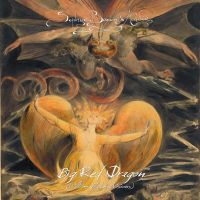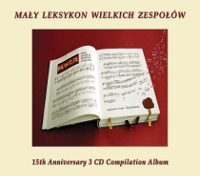 Sophya Baccini has built a reputation in the Italian scene for her vocal prowess, recording with various bands (most notably Presence) and performing in multiple languages. The daughter of a tenor singer she has been immersed in music since a very young age and released her debut solo album ‘Aradia’ in 2009 then took as the name of her next project, ‘Big Red Dragon (William Blake’s Visions)’. As is suggested by the title, this album is based on the work of Blake (although somewhat sadly there isn’t a song called ‘The Tiger’, which is probably one of his best-known works). Sophya decided that this would best be undertaken as a symphonic progressive rock album, but there are passages where it is just her and a piano, although at others it is more full-blown. Not all of the album is in English, and she has also brought in a host of guests to augment her own band, including Christian Decamps (Ange) Sonja Kristina (Curved Air) Elisa Montaldo (Il Tempio Delle Clessidre) Steve Sylvester (Death SS), Lino Vairetti (Osanna), Irwin Vairetti (Osanna), Enrico Iglio (Presence) and Roberto Tiranti (Mangala Vallis).
Sophya Baccini has built a reputation in the Italian scene for her vocal prowess, recording with various bands (most notably Presence) and performing in multiple languages. The daughter of a tenor singer she has been immersed in music since a very young age and released her debut solo album ‘Aradia’ in 2009 then took as the name of her next project, ‘Big Red Dragon (William Blake’s Visions)’. As is suggested by the title, this album is based on the work of Blake (although somewhat sadly there isn’t a song called ‘The Tiger’, which is probably one of his best-known works). Sophya decided that this would best be undertaken as a symphonic progressive rock album, but there are passages where it is just her and a piano, although at others it is more full-blown. Not all of the album is in English, and she has also brought in a host of guests to augment her own band, including Christian Decamps (Ange) Sonja Kristina (Curved Air) Elisa Montaldo (Il Tempio Delle Clessidre) Steve Sylvester (Death SS), Lino Vairetti (Osanna), Irwin Vairetti (Osanna), Enrico Iglio (Presence) and Roberto Tiranti (Mangala Vallis).
Somewhat unfairly I found myself comparing this with Clive Nolan’s ‘Alchemy’, and while there is no doubt at all that this is an incredibly clever album, I found that it was something that I enjoyed only in bits and pieces as opposed to throughout with not enough hooks. It feels much more like a classical piece of music than a progressive rock album, and I am sure that this is deliberate intent, but not really what I want to hear. The vocals are wonderful, and when the album really gets going, as it does on the much more upbeat “The Number” then it shows just what is missing.
I would have much preferred for this to be less clever, and less pure classical/operatic, but I am fully aware that his is just down to personal choice and that there will be many who will feel that this an incredible piece of work, which it undoubtedly is, just not something I want to play a great deal. It closes of course with Blake’s most famous poem, which was put to music by Sir Hubert Parry many years after his death. “Jerusalem” has been recorded in many different styles, and is seen by many as one of the most quintessential English songs of all time. ELP’s version is one of the most well-known, and to her credit Sophya has created an arrangement that is very different to many, with multi-layered female vocals and a sparse musical backing, but somehow it doesn’t gel right with me. I knew the song as a hymn long before I came across ELP’s version, and love the majesty and power that this demands and the emotion that it always invokes, but somehow here it seems somewhat sterile and devoid of passion. A very clever album, but just not for me.







